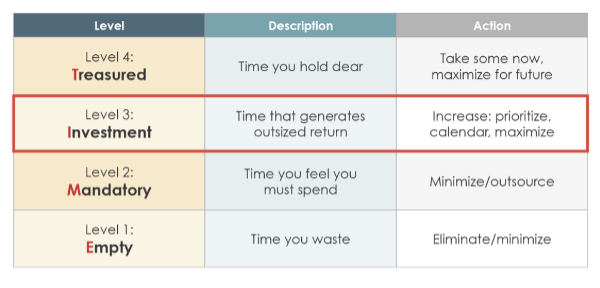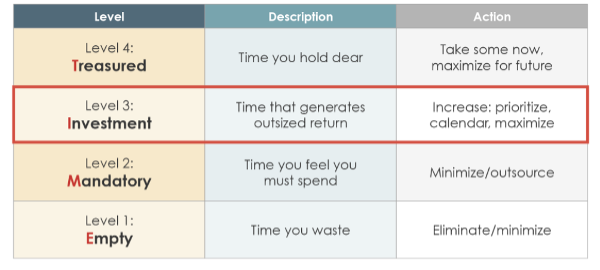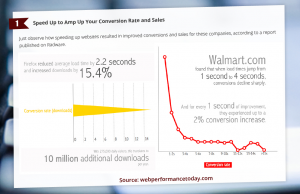“How we spend our days, is, of course, how we spend your lives.”
I love this quote from Annie Dillard. It’s incredibly simple yet incredibly profound. So many of us walk through our days like zombies. Doing things because that’s what we do. Eating things because that’s what we eat. Following routines that happened upon us. Reacting to others and the world around us.
Before we know it, we wake up and half our lives have passed us by.
How have you spent your days? How have you spent your life?
4 Levels of TIME
Every second of every day falls into one of the four categories of TIME:
- Treasured
- Investment
- Mandatory
- Empty

Treasured: This is time you cherish. The time you hold dear, doing things you love with people you love. It could be spending time with your friends or family, traveling, going to shows, working out, meditating, playing sports, participating in a hobby, or anything that fills you up and makes you feel good.
Investment: This is time spent that generates an outsized return. It’s working on your priorities and working towards your goals.
Mandatory: This is time spent doing things you feel you must do. This could be administrative tasks, mowing the lawn, paying bills, grocery shopping, and so on.
Empty: This is time that you waste. Maybe it’s scrolling social media feeds, reading US Weekly, or playing video games for hours.
In our productivity research, featured in the new book Not Today: The 9 Habits of Extreme Productivity, we found that 47% of people spend a significant amount of time on activities that are either non-value-add (Mandatory) or are outright wasting time (Empty) during a typical workday.
47%! That’s nearly half a workday.
However, the most productive people (The XP) are wasting much less time and spending much more time on priorities to reach their goals: 5.7 hours per day on Investment activities compared to just 3.9 hours for The Rest.
In a typical work week, that represents nine more hours per week of Investment time. That’s:
- 9 more hours for your priorities.
- 9 more hours to lead and inspire.
- 9 more hours of studying.
- 9 more hours to build a strategy to impress leadership.
- 9 more hours of writing.
- 9 more hours of coaching your team to greatness.
- 9 more hours to think big picture.
Nine more hours per week, every week, to make the magic happen, without working one extra minute.
You might wonder if these extremely productive people are putting off their Treasured activities until they achieve their goals. Turns out, the majority are maximizing both Investment and Treasured time. They focus on their priorities and fill their tanks.
The Mindset of TIME
TIME is not only an organizing framework for managing how you spend your days but also a mindset.
How you define your time is deeply personal. What is Treasured to one person may be Empty to another. Your Investment time might be another person’s Mandatory time. What falls into each of the four categories will depend on what you value, what’s important to you at any given point in time.
For example, someone may love work and feel the majority of their work time is Treasured. Someone else may consider work as strictly Mandatory, something they feel they have to do. There is no right or wrong judgment about which activity belongs in which category.
TIME Is Dynamic
What’s important is knowing and defining the categories for yourself. It’s not definitive. It’s what you need at that given point and how you view it at that moment.
Some days binge-watching Grey’s Anatomy is exactly what I need to recharge. It’s Treasured time. However, if I did that every day, it wouldn’t have the same effect. If I did that every day, it wouldn’t feel good anymore. The line of demarcation between Treasured and Empty time can be fuzzy. And it changes.
When does it change the most? When you examine it.
It’s easy to simply keep watching the next episode, to keep eating the rest of the candy bar, to watch one more YouTube video. But does the 19th bite of the candy bar taste as good as the first bite? Is the 7th cat video as funny and novel as the first one?
The TIME Transformation
When you step back and examine your time and are mindful of how you’re spending it, labeling it in each of the four categories, you can be much more deliberate in what you choose to do and not to do.
Accepting the TIME framework, and viewing each day, hour, and minute through this lens, is incredibly powerful. It’s transformational.
This is no exaggeration.
Not only will you find more time for your work priorities, but also create time for yourself.
A great way to think about TIME is to:
- Take Treasured
- Increase Investment
- Minimize Mandatory
- Eliminate Empty
When you do this, you’ll look back at your days and your life and feel good about how you spent them.
Business & Finance Articles on Business 2 Community
(22)
Report Post






